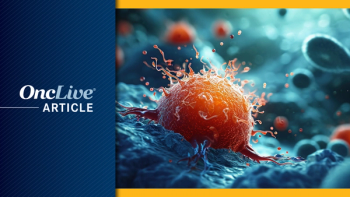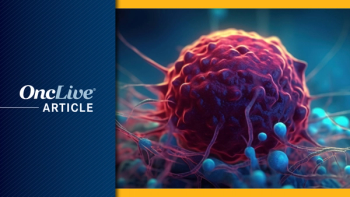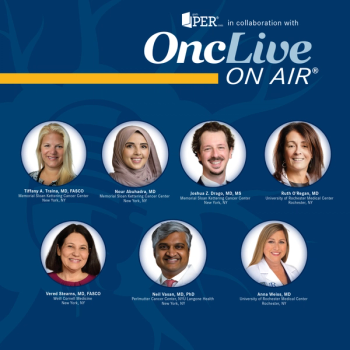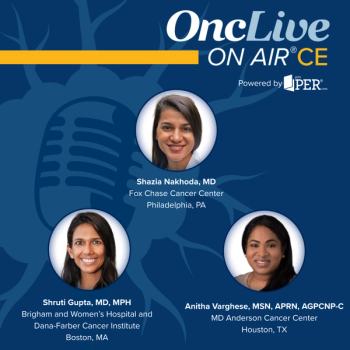
Important Considerations for Biomarker Testing in NSCLC at Key Points in Treatment Journey
The biomarker testing landscape has evolved over the years, affecting how oncologists approach lung cancer.
The Importance of Biomarker Testing in Patients' Treatment Journeys
The biomarker testing landscape has evolved over the years, affecting how oncologists approach lung cancer.1 Today, oncologists can better optimize personalized treatment plans for their patients through comprehensive biomarker testing at diagnosis as well as multiple points along patients’ treatment journeys.2
“Biomarkers are complex with lung cancer, but it’s critical to emphasize that knowing these biomarkers can be essential to help determine a patient’s management plan,”3 says Edward S. Kim, MD, MBA, physician in chief at City of Hope Orange County and vice physician in chief at City of Hope National Medical Center. “Starting treatment after comprehensive biomarker testing can help inform the treatment plan and patients who have an actionable mutation can be evaluated to determine if targeted therapy may be appropriate.”3
And beyond diagnosis, biomarker testing should play a key role for understanding the mutations that are driving the cancer at progression and recurrence.2
Still, gaps in testing remain, driven by a number of factors including costs, hospital operational issues and where a patient is diagnosed.4 In addition, biomarker testing results do not always follow patients through their cancer journey.5
To help overcome some of these issues and increase the rates of biomarker testing for patients with non-small cell lung cancer (NSCLC), Dr. Kim provides considerations for medical professionals and cancer center staff to help implement biomarker testing.
Ensure Biomarker Testing is Comprehensive
For patients with non-squamous NSCLC, biomarker testing is especially crucial as roughly 45% of patients harbor an actionable molecular driver mutation, but only approximately 50% of metastatic patients receive comprehensive biomarker testing.*6,7 Clinical guidelines recommend using broad panel next-generation sequencing (NGS) tests to search for all known actionable mutations, rather than a single-gene test.8
“It is important to use testing platforms that are comprehensive to identify all actionable biomarkers,” says Dr. Kim. This is even more critical today as there are nine actionable molecular biomarkers in NSCLC, including the KRAS G12C mutation, one of the most common driver mutations in NSCLC found in roughly 1 in 8 (13%) of patients.1,6,9
“Consider testing for KRAS G12C in all eligible patients with NSCLC at diagnosis,”3 adds Dr. Kim.
Test Throughout the Patient Treatment Journey and Retrieve Results When Available
Furthermore, biomarker testing shouldn’t end at diagnosis. It’s a critical tool to utilize over the course of a patient’s treatment journey, notably at progression, recurrence and when patients stop responding to treatment.3
For patients with NSCLC who have had previous biomarker testing but are no longer responding to treatment, Dr. Kim recommends reassessing the driver mutations through repeat tissue biopsies. This testing and evaluation can detect changes in a tumor’s genetic profile that could reveal why a patient’s cancer has grown or determine if patients are eligible for new clinical trials or alternative targeted therapies.3,10
It’s also important to retrieve and review biomarker testing results for patients who have had testing and have transferred physicians or switched to a new practice as these results can help provide a more complete picture and inform treatment decisions.3,11
Consider Liquid Biopsy as a Useful Tool to Identify Driver Mutations in NSCLC
Recognizing that repeat tissue biopsies may not always be feasible, Dr. Kim advises that liquid biopsies should be used to identify biomarkers in patients with NSCLC where a diagnosis has been established but there isn’t an adequate amount of tissue to run a tissue biopsy biomarker analysis.2
Liquid biopsies can also be useful in practice to monitor any molecular changes during treatment as it is a less invasive way to collect samples, when tumor tissue is inadequate for analysis.2
“Liquid biopsies can be helpful,” Dr. Kim says, but he notes that they should not replace tissue biopsies. Because of variable tumor shedding and assay sensitivity, confirming negative liquid biopsy results with tissue whenever possible is recommended, as mutations cannot be ruled out from a liquid sample alone.12
Partner and Communicate to Help Overcome Barriers to Biomarker Testing
“I believe oncologists want to do biomarker testing, but there are many challenges that prevent comprehensive biomarker testing in a timely manner,” says Dr. Kim.
The gap can be attributed to a range of factors, from expertise and understanding, to resources and operational challenges, to cost and reimbursement issues.4 For example, it can be hard to schedule an appointment for an interventional biopsy or the local lab may not have the bandwidth to perform the testing or may not understand the process.
“Between academic and community centers, there’s varying sets of expertise and resources.4,13 The majority of oncologists are testing according to the guidelines, but there are gaps for who’s doing the testing which can be due to various barriers.4,13 It seems like it should be automatic, but it’s not always happening,” explains Dr. Kim, who previously treated patients in the community setting for over a decade.4,13
Dr. Kim has found it useful to reach out to other key care team members involved to discuss the case and establish understanding of what is needed for testing to be successful and find dedicated partners within the network who recognize the importance of biomarker testing.
“Unless you have dedicated people in community centers who understand that you need tissue biopsies quickly and good quality tissues, it can be challenging. Oncologists should consider finding a partner and a multi-disciplinary group to overcome some of these challenges because finding engaged folks and growing that circle of engagement can help you form a reliable team for conducting comprehensive biomarker testing in a timely manner.”
To find resources for comprehensive biomarker testing and learn more about biomarker testing for your patients with KRAS G12C positive NSCLC, visit
*A retrospective, observational study assessing real-world biomarker testing patterns in 3,474 patients with metastatic NSCLC from community oncology practices within The US Oncology Network between 2018 and 2020.
References
- Tan AC, et al. J Clin Oncol. 2022;40(6):611-625.
- Rolfo C, et al. J Thorac Oncol. 2018;13(9):1248-1268.
- Pennell NA, et al. Am Soc Clin Oncol Educ Book. 2019;39:531-542.
- Smeltzer MP, et al. J Thorac Oncol. 2020;15(9):1434-1448.
- Kim ES, et al. J Thorac Oncol. 2019;14(3):338-342.
- Data on File, Amgen; 2020.
- Robert NJ, et al. Lung Cancer. 2022;166:197-204.
- Villaruz LC, et al. Front Oncol. 2023;13:1124167.
- FDA. FDA grants accelerated approval to fam-trastuzumab deruxtecan-nxki for HER2-mutant non-small cell lung cancer.
https://www.fda.gov/drugs/resources-information-approved-drugs/fda-grants-accelerated-approval-fam-trastuzumab-deruxtecan-nxki-her2-mutant-non-small-cell-lung . Accessed May 9, 2023. - Ahmadzada T, et al. J Clin Med. 2018;7(6):153.
- Li MM, et al. J Mol Diagn. 2017;19(1):4-23.
- Schwartzberg LS, et al. JTO Clin Res Rep. 2022;3(9):100386.
- John A, et al. Adv Ther. 2021;38(3):1552-1566.




































